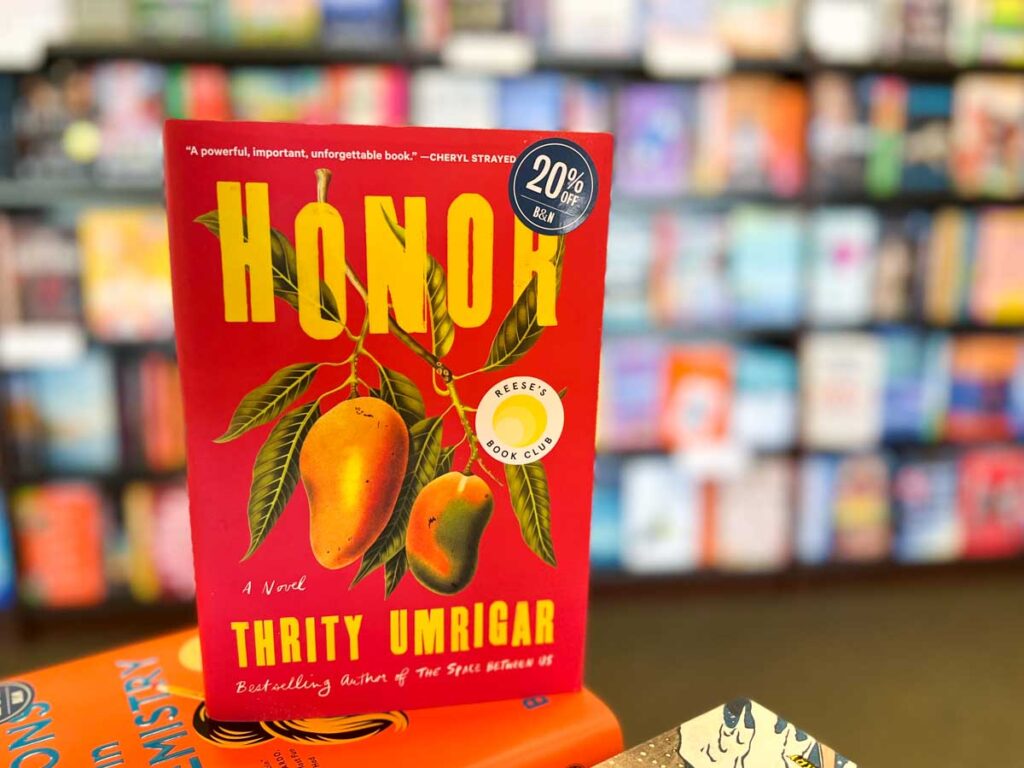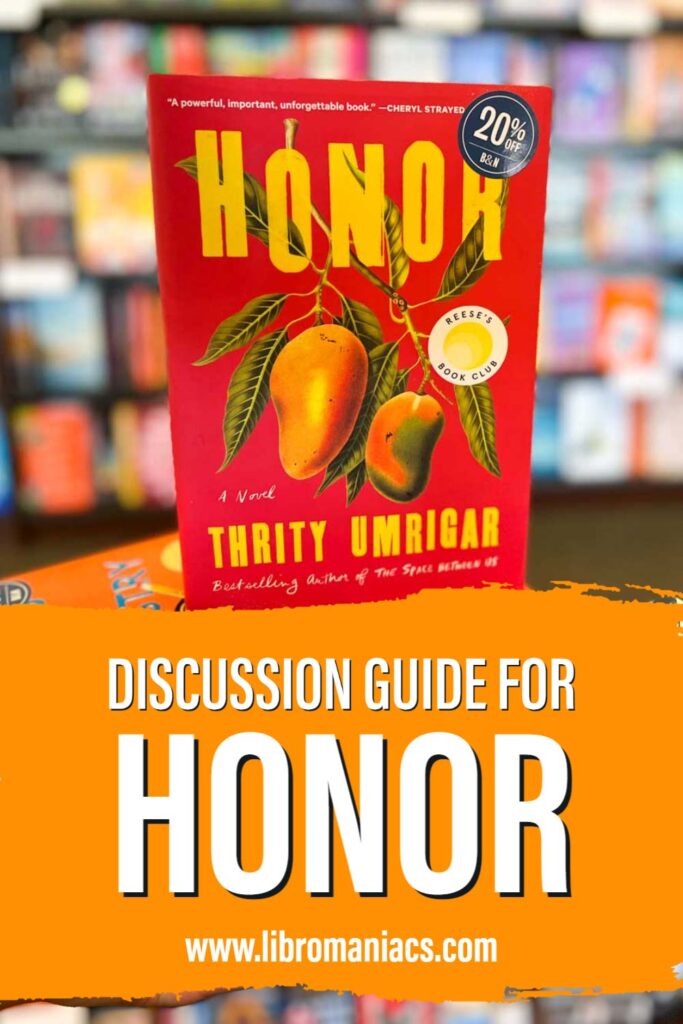Thrity Umrigar delivers a moving story following two romances that began in dramatically different circumstances. Journalist Smita reluctantly returns to her home country of India to cover the story of Meena, a Hindu woman ostracized and abused by her family and village for marrying a Muslim man. While dealing with her own complicated relationship with India, Smita begins to have complicated feelings for her traveling companion Mohan. Our Honor discussion guide can help you explore the deep and rich cultural issues explored in this book.
These Honor book club questions will prompt you through the book’s cultural examinations, the impact of history, love, and the choices we make in life. Also included in the book guide are a synopsis, and selected reviews for additional viewpoints. If you are looking for another similar book to read, scroll down to get recommendations for 3 books like Honor.

(This article contains affiliate links. This means that if you choose to purchase, I’ll make a small commission.)
Honor Synopsis
Honor, Thrity Umrigar
In this riveting and immersive novel, bestselling author Thrity Umrigar tells the story of two couples and the sometimes dangerous and heartbreaking challenges of love across a cultural divide.
Indian American journalist Smita has returned to India to cover a story, but reluctantly: long ago she and her family left the country with no intention of ever coming back. As she follows the case of Meena—a Hindu woman attacked by members of her own village and her own family for marrying a Muslim man—Smita comes face to face with a society where tradition carries more weight than one’s own heart, and a story that threatens to unearth the painful secrets of Smita’s own past. While Meena’s fate hangs in the balance, Smita tries in every way she can to right the scales. She also finds herself increasingly drawn to Mohan, an Indian man she meets while on assignment. But the dual love stories of Honor are as different as the cultures of Meena and Smita themselves: Smita realizes she has the freedom to enter into a casual affair, knowing she can decide later how much it means to her.
In this tender and evocative novel about love, hope, familial devotion, betrayal, and sacrifice, Thrity Umrigar shows us two courageous women trying to navigate how to be true to their homelands and themselves at the same time.
10 Honor Book Club Questions
These questions have been tailored to this book’s specific reading experience, but if you want more ideas, we also have an article with 101 generic book club questions.
- “Human beings could apparently be turned into killers as effortlessly as turning a key. All one had to do was use a few buzzwords: God. Country, Religion. Honor.”
How do the characters in this book use these powerful words to justify their cruelty? Do they also use them for good?
- “You have to understand that I wrote ‘Honor’ during the Trump years,” Umrigar says in an LA Times article. “I was writing about India, but I was also writing about my own adopted country. This othering of others is not a phenomena you can assign to any one country. The trend winds are blowing across the world’s two largest democracies, India and the United States. I am sometimes appalled and bewildered and dismayed by the parallels.”
What do you think about her quote? Can you see any parallels in our own culture and country to the discrimination shown in this novel?
- What did you think about Smita and Mohan’s relationship? Did it seem realistic, or romantic?
- “While Meena had been battling for her life and, later, fighting against crippling social ostracizing, Smita had been sitting in cafés in Brooklyn with her friends, sipping her cappuccinos, all of them feeling aggrieved as they talked about acts of microaggression and instances of cultural appropriation, about being ghosted by a boyfriend or being overlooked for a promotion. How trivial those concerns now seemed. How foolish she had been to join that chorus of perceived slights and insults. How American she had become to not see America for what it had been for her family—a harbor, a shelter, a refuge.”
What do you think about Smita’s revelation? Is she right to feel guilty about her previous concerns?
- Smita and Meena both fall in love in this novel. How do they approach their romances differently? How do their past and current situations affect their approach to romance and marriage?
- What do you think the future will be like for Smita and Mohan? What about Meena’s daughter?
- “But you don’t love something because you’re blind to its faults, right? You love it despite its flaws.”
Smita is constantly pointing out to Mohan that India is different for her than it is him. How does she experience the country differently? How much of that is due to class and gender?
- Meena’s fate is unbearably cruel. What would you have done in her situation? Did she have any other options?
- “The most dangerous animal in this world is a man with wounded pride. The old, timeless India, a country scarred by ignorance, illiteracy and superstition, governed by men who dropped their poison pellets of communal hatred onto a people who mistook revenge for honor and blood lust for tradition.”
Do you see any glimmers of hope for the future in this novel?
- The title of this novel, Honor, is dealt with in many different ways in this book. What are some of the different acts of honor, or ideas of the meaning of honor in this book?
Selected Reviews for Honor
“Given the plot’s content, it should come as no surprise that there are very difficult scenes to read. They’re worth wading through though if it means you get to experience this beautiful, fast-moving story about love, prejudice, and sacrifice.”
“On page 280 of this book, Smita notes how frequently the West takes stories from India (and pretty much anywhere that isn’t Europe or the US) and feed on them to the point of voyeurism and poverty p*rn. It’s an interesting point, but by the time the author makes it, Honor has already turned into the very thing it disavows. Maybe if characters had been more fleshed out, if more nuance or care had been given to Smita and Meena’s stories, this could have been avoided. The things that happen in Honor are very real and ought to be addressed- but the author treats these traumas as commodities for western consumption. The romance in the last 50-100 pages comes out of left field for a happy ending that feels rushed considering the intense suffering in the rest of the book.”
“…it is a hard-hitting , evocative and compelling novel. The author has exhibited considerable restraint and respect while dealing with a sensitive topic. Not an easy read but when a story revolves around social evil, it is not meant to be. It is unfortunate when the very men who believe in upholding the honor, values and beliefs of a particular caste, creed or religion fail to comprehend that as human beings there is no honor in intolerance and discrimination, there is no honor in communal hatred and there is certainly no honor in violence fueled by that hatred. At the risk of sounding preachy, I will say that as one of many women who can confidently claim to have had it better, the question we can ask ourselves and act upon is what we can actually do for women who are not as fortunate.”
“I also thought that instead of concentrating on Smita’s unnecessary Americanness and her stupid love story, more pages should have been devoted to Meena and her actual story. Why is her village so backward? Why did her brother turn against her? What the hell happened to her sister? Why did she just disappear from the pages? Why bring a silly magician village chief into the picture? I thought that covering both stories took away from both.”
3 Books Like Honor
Honor was a Reese’s book club pick. If you like her suggestions, we have quite of few Reese’s guide, including The Dictionary of Lost Words, Next Year in Havana, Daisy Jones & the Six, Little Fires Everywhere, The Library Book, and Where the Crawdads Sing.
We’ve also got a discussion guide for The Covenant of Water (Abraham Verghese), which is also set in India and dealing with family and marriage themes.

Women Talking, Miriam Toews
In Women Talking, Toews tells the story of a group of Mennonite women through the recorded minutes of their women’s meetings. The only one who can write, a trusted male teacher named August, is the one to transcribe their stories.
Through their discussions we learn about their repressive culture, their views on it, and the horrible drugging and rapes they have experienced by members of their own community. The women’s discussion moves in and out of the ordinary and the tragic, as they discuss their lives and beliefs and decide what must be done.

Erotic Stories for Punjabi Widows, Balli Kaur Jaswal
Nikki lives her life separated from her Sikh Indian roots. When she decides to take on a job teaching creative writing in addition to her bartending job in London, she learns much more about the conservative Punjabi culture and the women in it. Through a mix-up, Punjabi widows show up to her class thinking they will learn basic English, and eventually Nikki is able to get the women to write about their innermost memories, thoughts, and even erotica.
Erotic Stories for Punjabi Widows examines the immigrant community in a humorous, touching way, and the conservative morality “police” who attempt to silence them. Read it for book club and use our Punjabi Widows discussion guide.

A Woman Is No Man, Etaf Rum
For another gripping tale of the effects of patriarchal control in religious cultures, pick up A Woman Is No Man. The story follows Deya, a young Arab-American woman facing an unwanted marriage pushed by her grandparents, who are raising her.
Deya receives a mysterious letter about her dead parents, leading her to question what really happened to them. Deya faces many complex realities about her culture and her parent’s past as the narrative weaves through Deya’s life and her mother Isra’s past life and choices.
Read it for book club and use our A Woman is No Man discussion guide.
Have a listen on Audible. Try audio books for free for 30 days.
Share these Honor book club questions with your friends:

